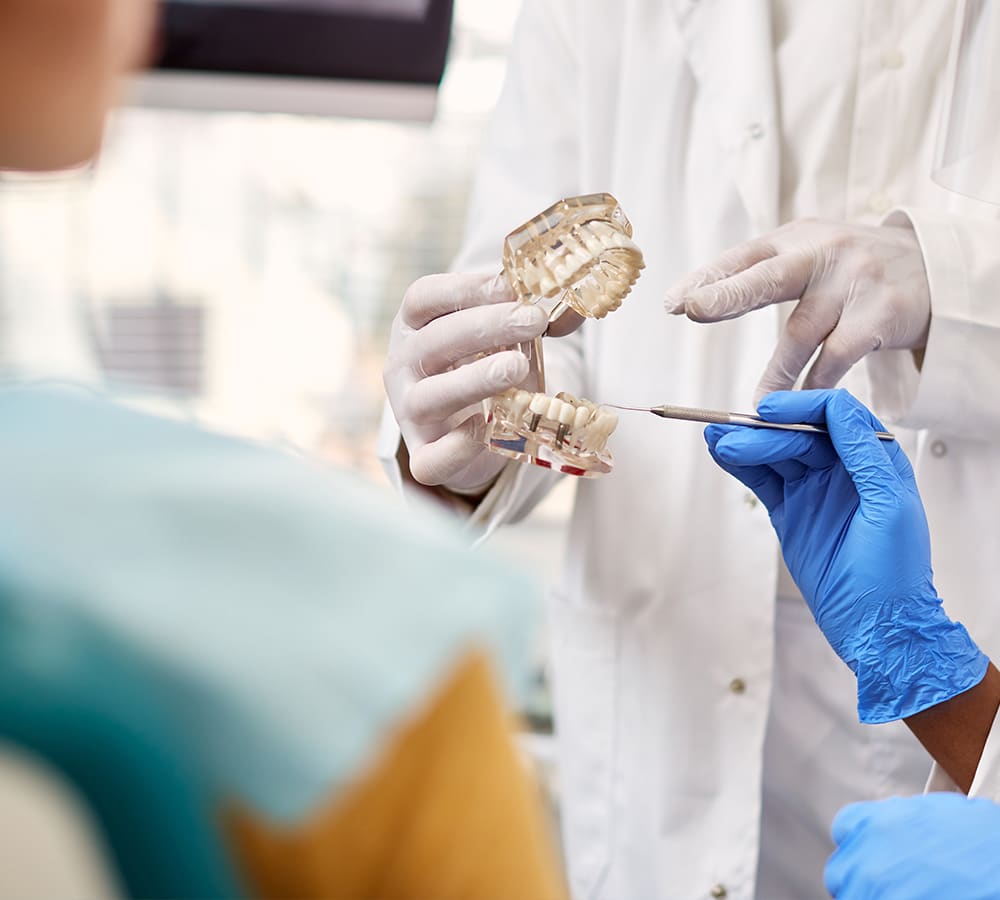
What is a Dental Implant?
A dental implant is a small titanium screw that it inserted into the jaw bone to serve as a root for an eventual tooth replacement. Implants can be used to replace a single lost tooth or many missing teeth.
Dental implants can help prevent issues caused by missing teeth since they stop the surrounding teeth from shifting, resolving bite issues or jaw joint pain, and helping restore your facial contour.
The Dental Implant Process
Your dentist will begin by surgically placing the implant into your jaw bone below the gum tissue. As the tissue heals, the implant bonds with the bone and attaches to the gums. This process takes around three to six months. During this time, a temporary tooth replacement will be installed over the screw to hide it.
Once you have healed, your dentist can attach a permanent tooth replacement, such as a dental crown, bridge or denture to the implant.
Why Replace Missing Teeth?
If a tooth is missing, the teeth surrounding the gap may begin to shift, creating misalignment issues. The jaw bone around the area may also begin to deteriorate, negatively affecting your ability to eat and talk.
Immediate Load Implants
An immediate load implant is a procedure in which an implant and a crown are placed together in a single appointment.
Usually, immediate load implants are placed in the front section of the mouth, since those teeth don't experience as much stress as your back molars.
Depending on which tooth needs the implant, you may still have a temporary restoration installed on your surgery date, with a permanent restoration placed a few months later. This is because your oral anatomy and gum tissues may shift as they heal from the implant, making the tooth replacement stand out.
Dental Implant FAQs
Read Preston Dental Centre's answers to frequently asked questions about dental implants:
-
How long does a dental implant last?
If a dental implant is cared for properly, it can last a lifetime. This care includes regular brushing and flossing at home, as well as dental exams and hygiene cleanings at our office in Saskatoon.
Other factors such as nutrition, genetics and the development of any dental diseases can impact the longevity of your dental implant.
-
How do I care for my dental implants?
Caring for a dental implant is the same as caring for your natural teeth.
Maintain your dental implant and the surrounding teeth by keeping up with proper flossing and brushing at home to help prevent decay.
-
Does getting a dental implant hurt?
Your dentist will administer anesthesia during your dental implant procedure to ensure that you do not feel any pain while it is happening.
Most patients report that any discomfort they felt during the few days following the procedure was easily managed with over-the-counter pain medicine.
You will also need to stick to a soft diet for a few weeks after getting a dental implant to avoid pain or irritation.
-
How long does the dental implant process take?
The entire dental implant process usually takes about three to six months to complete, depending on your treatment plan and how fast you heal.
Your dentist can provide a more specific timeline based on your unique case.
-
Will my insurance cover dental implants?
Some insurance companies will cover the cost of dental implants, while some will only pay for a portion of the cost. In other situations, insurance companies won't pay for any of the dental implant.
Check with your insurance provider to determine what part, if any, of your dental implant treatment will be covered.
